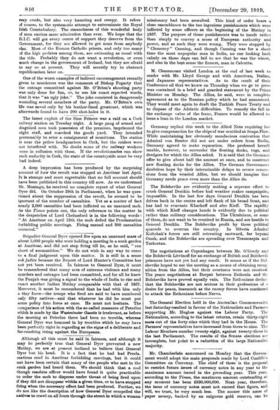Although all this must be said in fairness, and although
it may be perfectly true that General Dyer prevented a new Mutiny, we are at present inclined to believe that General Dyer lost his head. It is a fact that he had had Procla- mations read in Amritsar forbidding meetings, but it could not have been certain that many of the people who met in the sunk garden had heard them. We should think that a cool though resolute officer would have found it quite practicable to order the mob to disperse under threat of being fired upon if they did not disappear within a given time, or to have stopped firing when the necessary effect had been produced. Further, we do not like the description of how General Dyer compelled the natives to crawl on all fours through the street in which a woman
missionary had been assaulted. This kind of order bears a close resemblance to the too ingenious punishments which were inflicted by some officers at the beginning of the Mutiny in 1857. The purpose of those punishments was to insult rather than simply to convey a sense of European authority and power, and as such they were wrong. They were stopped by " Clemency" Canning, and though Canning was for a short time the most unpopular man in India, no one looking back calmly on those days can fail to see that he was the wisest, and also in the best sense the firmest, man in Calcutta.






































 Previous page
Previous page